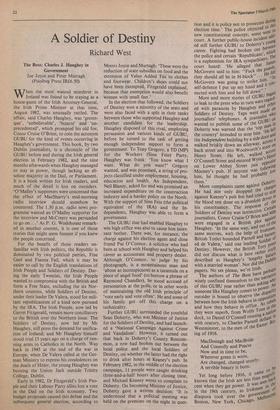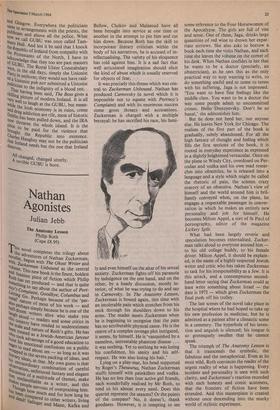A Soldier of Destiny
Richard West
The Boss: Charles J. Haughey in Government Joe Joyce and Peter Murtagh (Poolbeg Press 1R£6.50) when the most wanted murderer in Ireland was found to be staying as a house-guest of the Irish Attorney-General, the Irish Prime Minister at that time, August 1982, was unusually rattled. The affair, said Charles Haughey, was 'grotes- que', 'unbelievable', 'bizarre' and 'un- precedented', which prompted his old foe, Conor Cruise O'Brien, to coin the acronym GUBU for the kind of events occurring in Haughey's government. This book, by two Dublin journalists, is a chronicle of the GUBU before and during the Irish general election in February 1982, and the nine months afterwards when Haughey managed to stay in power, though lacking an ab- solute majority in the Dail, or Parliament. It is a book written for Irish readers, and much of the detail is lost on outsiders. 'O'Malley's supporters were concerned that the effect of MacSharry's mid-morning radio interview should somehow be countered. The 1.30 p.m. radio news pro- gramme wanted an O'Malley supporter for the interview and McCreery was persuaded to go on ...' As P. G. Wodehousi: remark- ed in another context, it is one of those stories that might seem funnier if you knew the people concerned.
For the benefit of those readers un- familiar with Irish politics, the Republic is dominated by two political parties, Fine Gael and Fianna Fail, which it may be easier to call by the English translations of Irish People and Soldiers of Destiny. Dur- ing the early Twenties, the Irish People wanted to compromise with the British and form a Free State, excluding the six Nor- thern counties, while Soldiers of Destiny, under their leader De Valera, stood for mili- tant republicanism of a kind now pursued by the IRA. The Irish People, now led by Garret Fitzgerald, remain more conciliatory to the British over the Northern issue. The Soldiers of Destiny, now led by Mr Haughey, still press the demand for unifica- tion of Ireland; and Mr Haughey himself stood trial 15 years ago on a charge of run- ning arms to Catholics in the North. Way back in 1945 at the end of the war in Europe, when De Valera called at the Ger- man Ministry to express his condolences on the death of Hitler, the young Haughey was burning the Union Jack outside Trinity College, Dublin.
Early in 1982, Dr Fitzgerald's Irish Peo- ple and their Labour Party allies lost a vote in the Dail on the Irish economy. Two budget proposals caused this defeat and the subsequent general election, according to Messrs Joyce and Murtagh: 'These were the reduction of state subsidies on food and the extension of Value Added Tax to clothes and footwear. Children's shoes could not have been exempted, Fitzgerald explained, because that exemption would also benefit women with small feet.'
In the election that followed, the Soldiers of Destiny won a minority of the seats and were also faced with a split in their ranks between those who supported Haughey and another candidate for the leadership. Haughey disposed of this rival, employing persuasion and various kinds of GUBU, before he turned to the task of getting enough independent support to form a government. To Tony Gregory, a TD (MP) for the Workers (Sinn Fein) Party, Haughey was frank: 'You know what I want. What do you want?' Gregory wanted, and was promised, a string of pro- jects classified under employment, housing, education and health. An Independent, Neil Blaney, asked for and was promised an increased expenditure on the construction industry and a harder policy on the North. With the support of Sinn Fein (the political equivalent of the IRA) and the In- dependents, Haughey was able to form a government.
The GUBU that had enabled Haughey to win high office was also to cause him inces- sant' bother. There was, for instance, the charge against his election agent and close friend Pat O'Connor, a solicitor who had been at school with Haughey and helped his career as accountant and property dealer. Although O'Connor, to judge by his photograph, is a mountainous man and 'about as inconspicuous as a tarantula on a piece of angel food' (to borrow a phrase of Raymond Chandler), he stood accused of personation at the polls, or in other words of maintaining the old Irish principle of 'vote early and vote often'. He and some of his family got off this charge on a technicality.
Further GUBU surrounded the youthful Sean Doherty, who was Minister of Justice for the Soldiers of Destiny, and had launch- ed a 'National Campaign Against Crime and Vandalism'. However, it turned out that back in Doherty's County Roscom- mon, a row had broken out between the local police and the local Soldiers of Destiny, on whether the latter had the right to drink after hours at Keaney's pub. In February 1982, in the middle of the election campaign, 11 people were caught drinking three-and-a-half hours after closing time, and Michael Keaney wrote to complain to Doherty. On becoming Minister of Justice, Doherty gave a written decision: 'It is understood that a political meeting was held on the premises on the night in ques-
election time.' The police objected to this new constitutional concept; some went to prose 3 c Maeredhuri 19M tion and it is policy not to prosecute court. A further public-house incident add" ed still further GUBU to Doherty's young career. Fighting had broken out between the police and certain 'Republicans, wbitil is a euphemism for IRA sympathisers. 'The court heard: 'He alleged that JO? McGovern said to him: "Fuck the gualfi; they should all be in H-block" • • He `ei.n McGovern was going to strike hint. self-defence I put up my hand and it co tl" nected with him and he fell down": More and more stories of GURU beg to leak to the press who in turn were regal't Soldiers of Destiny. Taps were made ed with paranoia by Haughey and other ° journalists' telephones. A journalist wu wanted to publish some of the GIJBO °.rin Doherty was warned that the 'top man t the country' intended to stop him. 'He '`d wthe kThe ddebpreins kdieyn td bo uwinl d an nng a ey ws iadye, doorsan a s back street and into Woolworth's Henry Street. He left, walked ocrol O'Connell Street and entered VVynn's 1-1°,,•tree on Lower Abbey Street just on1)°''„ Mooney's pub. If anyone was followl them.'
him, he thought he had probably
lost him, complaints came against DobertaYes. He had not only dropped the char' n store 01! against Keaney's pub but had tried to 03.;1 the blood test done on a drunken drivel1,1e his constituency. The response of the Soldiers of Destiny was instinctive. Cerito journalists, Conor Cruise O'Brien and 'st were engaged in a British plot agalll, Haughey. 'In the same way, and out of t":, same motives, with the help of Irishrne; British Tories hounded Parnell and harasof ed de Valera,' said one leading Soldiells Destiny. However, the British TorY
did not discuss what is here rather c°Yp described as Haughey's lengthY with a married woman'. Nor did the Du papers. No sex please, we're Irish.
The authors of The Boss have nPaerradi t why wisely confined themselves to th of this GUBU year rather than asking 741., someone like Haughey comes to power' rity outsider is bound to observe the disPtoti between how the Irish behave in opP0s1L.15 and how they behave in office. As re''itt e they were superb, from Wolfe Tone into wdoitchk,otroatDoaniel O'Connell rousing a,.,//3,,t 10 ing of 19167 Westminster, to the men of the Easter
to Charles Parnell►dena'„ts, MacDonagh and MacBride And Connolly and PearSe Now and in time to be, Wherever green is worn, Are changed, changed utterly:
A terrible beauty is born. obe Yet long before 1916, it carne t roc,. known that the Irish are less than tnagbacE cent when they get power. It was seer! the dBioasstpoonra New York,yoorvker, in the 19th century, as Irishmen In, of Cthheicaggoov,erMnmelroLurrie and Glasgow. Everywhere the politicians came to arrangements with the priests, the Publicans and above all the police. What now we call GUBU was once called Tam- many Hall. And lest it be said that I knock the Republic of Ireland from sympathy with the Protestants of the North, I have to acknowledge that they too are past masters of GUBU. The Royal Ulster Constabulary ‘:;ere, in the old days, simply the Unionist ranY in uniform; they would not have raid- ed a Unionist pub nor submitted a Unionist Politician to the indignity of a blood test. That having been said, The Boss gives a very chilling picture of modern Ireland. It is all Pi to laugh at the GUBU, but mean- while the Irish economy is in ruins, crime and drug addiction are rife, most of historic now has been pulled down, and the IRA threaten the whole island. It is the Price to be paid for the violence that °tight the Republic into existence. Charles that / Haughey may not be the politician deserve Ireland needs but the one that Ireland All changed, changed utterly,
A terrible GUBU is born.











































 Previous page
Previous page